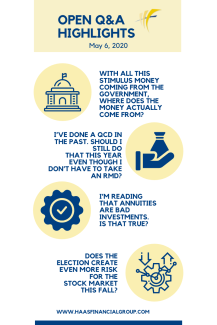Open Q&A Highlights - May 6th
Listen To The Full Discussion Here
Don't have time for the full 40 minutes? Transcript highlights are listed below or click here:
Intro (0:00 – 3:00)
(3:00) With all this stimulus money coming from the government, “Where does government money actually come from? Some savings somewhere?”
- Government doesn’t just have money sitting in the bank to send us all checks. So, they need to borrow the money and go into debt.
- They don’t go to a bank for loans, they are issuing government bonds and others (people, institutions, other governments) are willing to “buy” that debt/lend the government that money. Why are they willing to do this?
- Rather than being focused on the return ON their money – see money growing over time, they are worrying about the return OF their money. They want to park their money somewhere where they are confident that the value of their money doesn’t go down over time. US Government has the ability to make good on that money through their ability to tax, so people see that as an extremely safe place to invest, even if the return is very low.
- At historically low interest rates, government is happy to borrow money over time, and then pump that money back into the economy to produce GDP.
- They tax that activity which will allow the government to do what they need to do to pay it back over time.
(6:30) What type of risk does it pose if the government takes on this much debt?
- We are $25 trillion in debt (owe $6 trillion of that to ourselves).
- Economists are not concerned…yet. The interest rate to pay it back is very low and there is enough economic output (GDP) to cover that debt. For now…
- However, the government is only paying back the interest (not principal) and if they keep rolling over debt, it will never be paid off.
- A balanced budget will be important in the future to not tack on new debt and we need inflation to stay low.
(10:30) Who can buy this debt?
- Anybody can buy it. Individuals, institutions, government. Anybody focused on the return OF their dollar.
- Are we at risk if someone buys too much? The rhetoric on China “owning us” is exaggerated. They own 5% of our debt. The Federal Reserve plays a major role in our debt and could probably gobble up that debt too if someone doesn’t want to own our debt anymore.
(13:30) I’ve done a QCD in the past. Should I still do that this year even though I don’t have to take an RMD?
- What is a QCD? A Qualified Charitable Distribution (QCD) is a way to make a charitable contribution directly from a retirement account. The IRS forces you to take money out of taxable retirement accounts at age 72 (Required Minimum Distribution - RMD).
- If you don’t want to pay income taxes on the money, you could gift it directly to a charity. If you are going to be charitable, it’s a way to avoid paying income taxes on that money.
- If you don’t have to take money out your IRA because of the CARES Act, you might want to review other options for gifting to due to asset values being down and if you won’t get the tax benefits, then try to get the tax benefits elsewhere.
- This is very situational. If you have done QCD’s in the past, then we should definitely discuss this to see what options you have.
(18:00) I’m reading that annuities are bad investments. Is that true?
- An annuity is an investment vehicle and depends on your situation. An annuity is tax deferred. In the past, many would elect an annuity because they were fearful of losing money, so they were willing to purchase some sort of guarantee or protected income stream on their investment.
- Situational if they are good investment or not. But now you pay for that guarantee so it may not be the easiest way to grow your money if focused on return ON your dollar. Also, the interest rates are very low so they certainly aren’t as attractive to me right now.
- Probably more opportunity to grow your money elsewhere. There are other ways to manage risk in our opinion.
(22:00) Does the election create even MORE risk for the stock market this Fall?
- To me, does not appear to be much potential for major policy changes, changes in regulation, taxes, etc. with current candidates.
- Market likes that certainty so we feel that not much will change from a risk standpoint.
- Nobody should be changing their investments based on their political affiliations.
(29:00) Concerns over health and safety and some states opening back up
- Things will be different. But there are pockets of optimism in the economy and companies that are excelling through this. How people spend money may be different.
- From a health standpoint, you should proceed with caution if you are an at-risk person. But if treatments are helping, then fear may subside, and economic activity should pick back up again.
- Further testing will continue to provide answers and a timeline of events surrounding the virus
(36:49) End
Tracking # 1-05007535


